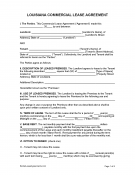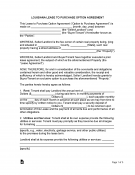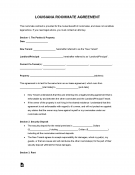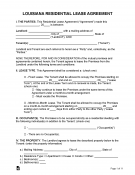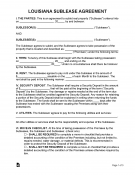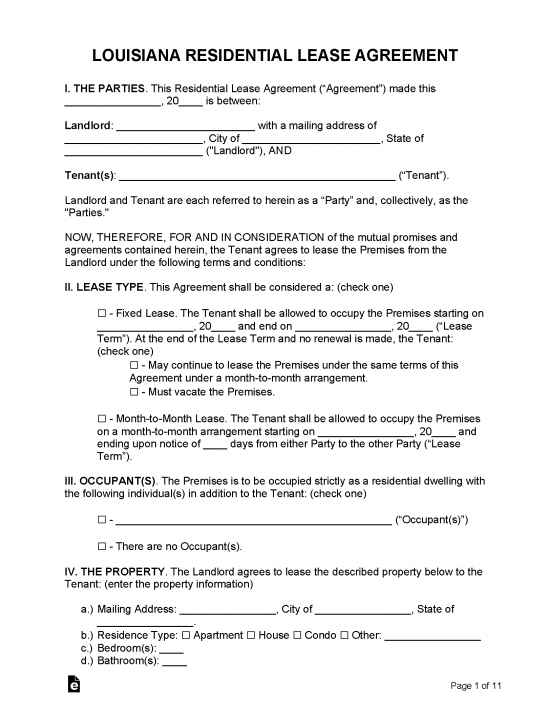Louisiana lease agreements formalize the terms of a tenancy in a landlord’s property. Both the landlord and the tenant will agree to the terms the written lease agreement sets out. Lease agreements will contain the monthly rent, the responsibilities of both parties, and other miscellaneous items, such as whether pets are permitted. Creating a lease agreement is highly recommended because it can help landlords and tenants avoid prolonged disputes.
Contents
By Type (6)
- Commercial Lease Agreement
- Month-to-Month Lease Agreement
- Rent-to-Own Lease Agreement
- Roommate Lease Agreement
- Standard Lease Agreement
- Sublease Agreement
Download: Adobe PDF, MS Word, Rich Text Format
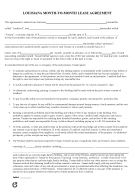 Month-to-Month Lease Agreement
Month-to-Month Lease Agreement
Download: Adobe PDF, MS Word, Rich Text Format
Download: Adobe PDF, MS Word, Rich Text Format
Download: Adobe PDF, MS Word, Rich Text Format
Download: Adobe PDF, MS Word, Rich Text Format
Download: Adobe PDF, MS Word, Rich Text Format
Landlord-Tenant Laws
Statutes – Unlike other states, Louisiana does not group its landlord-tenant law into a single act or chapter. The laws are grouped into laws dealing with leases generally, in the Civil Code, § 2668 through § 2729, laws dealing with eviction in the Code of Civil Procedure, § 4701 through § 4735, and ancillary provisions, in the Revised Statutes, § 9:3201 through 9:3261.1.
Required Disclosures (1)
Lead-Based Paint Disclosure – Under federal law, for leases of all dwelling units built before 1978, a landlord must disclose to a tenant the hazards associated with lead-based paints.
Security Deposit Laws
Maximum Amount ($)
There is no statutory limit to what a landlord may charge as a security deposit.
Returning to Tenant
A landlord must return the security deposit a tenant has provided within one (1) month of the termination of the lease agreement. It is the tenant’s responsibility to provide a new address to the landlord. The landlord may retain a portion of the security deposit to account for unpaid rent or to remedy problems with the unit created by a failure by the tenant to follow the terms of the rental agreement. If the landlord intends to retain the portion of the security deposit, the landlord must provide the tenant with a written notice and itemized explanation of all deductions. A tenant’s right to return of the security deposit does not apply if the tenant abandons the property without notice, or leaves prior to the agreed-on end of the lease agreement (R.S. § 9:3251).
When is Rent Due? (grace period)
A landlord and tenant may decide on the time and place at which rent is due in the lease agreement. There is no statutory requirement of a grace period.
Eviction Notice (non-payment)
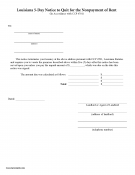 5-Day Notice to Pay or Quit – If a tenant fails to pay rent on the appointed day, the landlord or an agent may post this form on the dwelling unit and, if the tenant fails to pay the full amount owed within five (5) days, the landlord may begin the process of terminating the lease (CCP § 4701).
5-Day Notice to Pay or Quit – If a tenant fails to pay rent on the appointed day, the landlord or an agent may post this form on the dwelling unit and, if the tenant fails to pay the full amount owed within five (5) days, the landlord may begin the process of terminating the lease (CCP § 4701).
Download: Adobe PDF
Maximum Fees ($)
Late Rent Penalties
Louisiana law does not set a maximum late fee, but if a landlord chooses to impose a late fee, the fee must be mentioned in the lease agreement, and the fee must be reasonable to be enforced.
NSF Checks
There is no statute on the fee that may be charged for providing a rent check with insufficient funds, but the fee should be reasonable.
Tenant’s Unclaimed Property
There is no statute regarding a tenant’s unclaimed property. However, in the case of eviction, if a tenant leaves property behind, a landlord may obtain a court order for law enforcement officers to seize the property for eventual sale to offset debts owed (CCP § 4733).
